|
J.M. Barrie's Peter Pan has been brought to stage and screen many, many times since his debut back in 1902. First Stage presents a cleverly concise staging of the character’s origin late this season with Tinker Bell--a retelling of the classic story from the perspective of the very popular fairy who was the boy’s closest companion. It’s a magical show that contrasts the little fairy’s friendship with Peter Pan against the friendship between the villain Captain Hook and his bosun Mr. Smee. The central drama is brought to life amidst a rich visual reality of set, costuming and lights. Seasoned Director Jeff Frank puts together all of the right elements to develop a fantasy that holds a very compelling emotional reality without compromising the magic of Neverland. The title role is played by a couple of different student actresses in rotating casts. Chantae Miller of the “Adventure Cast” crafts a sophisticated portrayal of a fairy struggling with the concept of friendship at the possibility of losing a friend. The complexity of a flawed, little fairy is handled quite well by Miller in a performance that serves as a very solid emotional center. Student actress Luca Batory plays Peter in the same cast. Batory guides Peter from a timid, restless boy at his first meeting with Tinker Bell through to confident and...equally restless leader of Lost Boys in a fantastic world. The subtle and not-so-subtle changes within the personality of Peter aren’t lost to Batory, who puts in a performance that deftly matches Miller’s. Hook and Smee are played throughout the run by a couple of adult actors. Chris Klopatek is a nice-guy villain in the role of Mr. Smee. There’s a working-class wisdom about the character who really cares about Hook and manages a subtle equality with the menacing pirate in a refreshingly complex portrayal for kids’ fantasy. Ryan Schabach plays one of kid’s literature’s greatest villains with a whimsical villainy. The script keeps the character from ever drifting too far in the direction of frightening menace that the character might approach. Schabach finds a place somewhere between flawed humanity and bullying brashness. Younger kids won’t get nightmares. Older kids won’t find him a silly clown. Schabach navigates a nice middle ground for Hook. The world of Tinker Bell finds a nice place between peril and friendship in nearly every production element. Fight Choreographer Christopher Elst has composed a briskly-paced swashbuckling action for the show. Elst’s work can come across bracingly vivid. Here he’s slowed things down here. Little audience members won’t be frightened. A stage filled with combat action could feel overwhelming. Elst manages an almost enchanting rhythm to the action that never overpowers. Scenic Designer Sarah-Hunt Frank assembles a multi-platformed set with lots of little elements that can be moved around for a variety of different effects throughout the production. Everything is anchored in a nautical feel with ropes and masts and such. Lighting Designer Jason Fassl paints the set with the soft, magical glow of many fairy lights in a range of appealingly enchanting colors. In addition to scenic and lighting effects, a menagerie of little puppets add to the action including a charming alligator and a couple of adorable, little ducks. First Stage’s production of Tinker Bell runs through June 2nd at the Todd Wehr Theatre at the Marcus Center for the Performing Arts. For ticket reservations and more, visit First Stage online.
0 Comments
In and around the lobby of the Tenth Street Theatre prior to the show, Chris and Jane Flieller appeared to have all the energy and positivity of a couple of honor roll students about to graduate from high school. It’s nice to see that kind of energy in the final ever regular season show of the theatre company they started back in 1998. Their final show at the Tenth Street Theatre: The Fabulous Lipitones. It’s a fun, little comedy with a little bit of drama thrown-in. The four-part buddy comedy might feel a bit schmaltzy in places, but the sentimentality fits perfectly in a dramatic comedy about a barbershop quartet. Director Jane Flieller is great with this type of material. A show like this would have been more than a little cloying in anyone else's hands. Flieller is a seasoned professional who knows exactly what she's doing here and what she's doing here will be sorely missed until the next Flieller and Flieller project makes its way to the stage at some point in the undetermined future. As the play opens, three members of a barbershop quartet are mourning the loss of their fourth--a guy who had been with them forever. Without their very close fourth friend, the future is uncertain for The Fabulous Lipitones. They have mixed feelings about trying to compete again in a national competition against the barbershop juggernaut known as The Sons of Pitches. All seems lost until a chance meeting with a potential replacement keeps hope alive for the group. If they can overcome cultural differences and the challenges of advancing age, the newly re-formed quartet might just take home the national title. Rick Pendzich plays to his strengths as the heart of the group...a man that hasn’t really managed to grow-up even though he’s got a very professional job as a pharmacist. Nathan Marinan is compassionately passive in the role of a nice guy who might want to see the group survive the death of a good friend. The entire play takes place in a whimsical basement that he and the other three use as a rehearsal space. Steve Koehler manages the challenge of making a conservative, xenophobic alpha-male seem likable. He’s playing the manager of a local gym who is about to make a rather big business deal and can’t afford to have the group getting in the way of that...particularly when the new guy turns out to be an immigrant. Ethan Brittingham quite nearly steals the show in the role of “Bob.” Bob’s a Sikh who is working for a local auto mechanic. Brittingham is deeply charming as a relatively young guy who loves song and the US even if US immigration policy doesn’t exactly love him. A fair amount of the charm of Brittingham and the rest of the group comes in the form of overwhelmingly cute barbershop quartet choreography by Adam Estes. A comedy with music that isn’t exactly a musical comedy isn’t exactly the type of thing that quite exactly allows for very elaborate choreography, but Estes adds immeasurably to the heart of the show. Estes manages a rather deft fusion in moments which mix traditional barbershop dance with Sikh-inspired movement. The fusion of cultural elements in the show is present in the music direction of David Bonofiglio. In Tandem Theatre’s final regular season show The Fabulous Lipitones runs through May 19th at the Tenth St. Theatre on 628 N. 10th St. For ticket reservations and more, visit In Tandem online. Written in an era long before word processing, Herman Melville’s Moby Dick was fairly immense. Though its 206,000 words is fairly common for a modern novel, when the work was written, it doubtlessly felt fairly massive. The whaling epic about a ridiculously large whale conveyed immensity on so many levels from the physical to the abstract and metaphysical. It was a truly ambitious work. This month one of the smallest stages in town tackles a humble adaptation of the work as Off The Wall Theatre presents Call Me Ishmael--Dale Gutzman’s adaptation of the book. The tiny, little stage may not convey the titanic immensity of Melville’s work, but the cast holds the interpersonal drama of the show together quite well, bringing it down to an intimate drama focussing primarily on the passions and concerns of four people. Director Dale Gutzman and Technical Director David Roper have put together a visceral visual feel for the show. The action of the production swims from one scene tot he next ubder the power of minimal suggestion and clever direction of the eye with little more than sheets and a few props. This proves to have been a good move as any extensive scenic design would have compromised the flow and rhythm of a show which is so closely focussed on the drama of just a few people. Jake Russell plays the title character here. He’s a young man who wants to see the world. Russell’s wide-eyed wonder in the role serves as an emotional focal point to the show that serves it well against the murky ambition of the rest of the story. Nathan Danzer is a strong presence onstage in the role of Queequeg--a physically.imposing Polynesian prince of great experience and elegantly simple emotion. The stark simplicity of Dazer’s approach to the character fits well within a briskly-established relationship between Queequeg and Ishmael, which wastes little time in becoming romantic. The romance between the two men resonates on a very personal level that contrasts against the loftier, more intellectual relations between Starbuck and Captain Ahab. Mohammad N. ElBsat has a somewhat galvanizing energy as ship’s chief mate Mr. Stabuck. He’s acting captain for the early part of the play as the ship’s chief master lurks about in the shadows. ElBsat conjures thoughtful authority in the role that anchors the dramatic energy of the story until Ahab finally makes his appearance. Towering James Strange plays the obsessive Captain Ahab. Strange’s crisp intensity as the mysterious captain brings a sense of mystery to the production. Standing there on one leg and one ivory stump with an impressive scar across his face, Strange looks a bit like a special effect onstage. The rich authority of his voice launches the production forward into the hunt for the great white whale known as Moby Dick. Strange’s intensity draws the mood of the story over the edge into an ambitious darkness. Gutzman and company know exactly which direction to point their tiny stage in to chase off after one of the greatest works of English literature. Gutzman’s unique take on the classic is an enjoyable reflection of a great work that doesn’t even come close to approach the towering accomplishment if its source material, but it doesn’t need to. Gutzman’s reflections on passion and ambition fill the tiny space of his theatre quite well. To pursue any more than interpersonal drama would have been folly. Off The Wall Theatre’s production of Call Me Ishmael runs through April 28th at the tiny, little studio space on 127 E. Wells St. For ticket reservations and more, visit Off The Wall online. Theatre Gigante closed-out its season with a beautiful, little one-hour, one-evening show last night at St. John’s on the Lake. A spacious room on the ground floor of the retirement community served as a stage for four as the group presented an exceedingly accessible presentation. Writer/performers Isabelle Kralj and Mark Anderson were joined by the Chicago-based singer/songwriter team of Diane Christiansen and Steve Dawson in a show they called Will We Ever Get There? The stage is kind of a demanding place. People who are dedicated to hanging out onstage have a tendency to spend a lot of time with each other. People who spend a lot of time together have a tendency to fall in love. Will We Ever Get There? Featured a couple of couples doing material drawn from lives spent together. Kralj and Anderson’s conversational bits alternated with songs sung by Christiansen with Dawson on guitar. Witty linguistic bits wove their way around a casually tender folk. Will We Ever Get There? is a very clever kind of casual. The four onstage made the mood feel totally natural even though...y’know...they were four people onstage with amplification and everyone watching them. The cleverness about this lies in the natural feel of it all. Whenever a couple of actors play people who have known each other forever, we as an audience know that it’s fake. As social creatures, we’re alarmingly aware of the subtle cues between two people who genuinely HAVE been together forever. Even the best actors can’t totally fake those cues. Familiarity rests in an ineffable constellation of little cues that are difficult to define. Familiarity is tricky onstage. As audience, we notice its absence and let it pass in the interest of engaging in a show. The charm in Will We Ever Get There? lies in watching a couple of people who have genuinely spent a life together being together onstage. It feels like a special kind of perfect to watch Kralj and Anderson together playing playful echoes of themselves onstage. Whether they’re talking about Chekhov or lost in a car or just gazing at a Warhol, Kralj and Anderson have a kind of graceful stillness about their conversations onstage. Words and phrases are encouraged into multiple meanings by warm silences. They do so much together onstage over the course of a season with Gigante, it’s nice to see them being themselves at the end of it all before the long trek through summer before the next Gigante show. It’s been performed before. It’ll doubtlessly be performed again. Part of the extreme cleverness of Will We Ever Get There? is its adaptability. It could fit itself into and around a variety of different formats. Here it shared space with some rather charismatic folk music. An old guitarist friend of mine made a distinction between musicians and bards. Musicians play the music they may or may not have written. They could be rich and famous or alone and unknown. Bards, though...bards live the music they perform. Yes, they’re performing music but they might as well be talking. The guitar and melodic lyric are like talking for them. Christiansen and Dawson are bards. They were sent a copy of Kralj and Anderson’s script and they chose songs to perform between each bit of dialogue. One imagines that there was a rather large pool of work to choose from...they chose the stuff they wrote about living together. Relationship stuff. Beautiful stuff. It was a free performance at a retirement community, but it could have just as easily taken place in a park or a cafe or a teahouse somewhere. It’s so refreshing to see art brought together with such elegantly simple grace. Stripped of all its flashy production, performance can relax and live through people connecting with each other. No greater sophistication. Four people onstage. Sometimes thats all it takes to have a good time at a show. Theatre Gigante’s 2018-2019 season has closed. For more information on upcoming shows as they are announced, visit Theatre Gigante online. Or visit Theatre Gigante on Facebook. Early 20th century political satire The Last Cyclist remains tragically prescient decades after it was first written in a Jewish ghetto under the oppression of the Nazis. The staging at Cardinal Stritch this month cleverly reflects the alarmingly persistent truth: those with the right influence a can rise to power by finding an enemy that the public can agree to. A diverse ensemble under the direction of Mark Boergers glides through a tale of ignorance, hatred and cruelty in a dramatic presentation animated by dark humor that reflects current events.The script is written by Naomi Patz based on an original cabaret by Karel Švenk. The opening of the play firmly anchors the play in history. Inhabitants of the Terezin Ghetto gather for the final dress rehearsal of The Last Cyclist. Scenic Greg Kaye makes impressive use of old wooden chairs, crates and flowing white sheets to invoke the feeling of a dilapidated ghetto. The full breadth of the spacious Nancy Kendall Mainstage Theater is barricaded off by the scenery, giving a kind of thematic immersion in the aesthetic of a walled-off ghetto. Sarah Burger's sound design adds to the atmosphere as the audience files in to the show. There's the sound of a small village pulsing through the theatre. Joel Kopischke plays a humbly heroic figure bringing together people living in awful conditions to perform a narrative that might give them some sense of insight in the squalor of their lives under Nazi oppression. Kopischke plays a hero of a different kind as the play settles-in. In the play within the play, Kopischke is a grocer who is in love with a woman he finds himself incredibly nervous around. Laura Monagle endearingly plays his love interest in a few remarkably sweet scenes that serve as a central emotional compass for the show. Villainy enters the picture in the form of a cynical, avaricious figure played with deliciously casual arrogance by Marcee Doherty-Elst. A quick discussion with a few others suggests that bicycle riders might be the source of all the ensemble’s problems—an assertion backed-up by Randall T. Anderson as an equally cynical figure who seeks power and authority of his own. The two central authority figures are backed-up by a host of lunatics. At the center of the lunacy are a couple of playfully mad underlings played with alarming charm by Maggie Marks and Nick Narcisi. The fun playfulness of Marks and Narcisi allows the despicable nature of what they’re doing to feel like in inconsequentially silly game until things start to look dark and foreboding for our hero. Thus is the complexity of totalitarianism brought into strikingly simple clarity for a provocatively concise intermission-less evening at the theatre. The basic plot of the story is so primal and simplistic that it could echo into nearly any era. All that would be needed here is the demand to build a wall to keep out the cyclists, and The Last Cyclist would be a chillingly contemporary satire on the current administration. Adaptations of The Last Cyclist could be done in every language on the planet on stages all over the world and it would be as pertinent as it is here. (I'd love to see a version of the satire done entirely in Spanish on the US-Mexico Border.) It’s disturbing that something as ugly as institutionalized persecution still feels so relevant. It’s that disgustingly enduring relevance that keeps The Last Cyclist so very, very important. The Last Cyclist runs through April 14th at Cardinal Stritch on 6801 N. Yates Road. For ticket reservations and more, visit Cardinal Stritch online. The show is presented by Cardinal Stritch University, The Nathan and Esther Pelz Holocaust Education Resource Center (HERC) and The Harry and Rose Samson Jewish Community Center. Cooperative Performance’s all-new original show Machina Persona is an endearingly social dramatic comedy. J.J. Gatesman and company hav developed a cast of six characters who exist in a dreamy, little steampunk community. Each one serves a different archetypal role in the cast...there’s an engineer and a pilot and a scientist and so on. They’re all working together to develop a flying machine. The cast speaks to each other and (occasionally) the audience in a strange vocabulary that seems to echo English, French, Japanese and a host of other languages. The characters assert themselves in bewilderingly sophisticated social interactions between each other. There’s a central plot around which all of the characters orbit, but primarily this is a chance to hang out with a cleverly-rendered community of characters for less than an hour and a half without intermission. The very human fantasy of another world settles-in for a dazzling, little theatrical fugue. A huge budge isn’t needed for a dreamy theatrical experience. What Gatesman and company deliver here is akin to being dropped in a completely foreign community of heartwarmingly fragile people. The archetypes represented in the cast are echoes of a tradition going back to commedia dell'arte. What J.J. Gatesman and company deliver here is so intrinsically lovable that it echoes more recent communities of endearingly cute iconic characters like the Smurfs, the Care Bears or the inhabitants of Ninjatown. Here’s a look at the cast of six: Maura Atwood is The Stowaway--Recognizable by a smile accompanying long, flowing curly red hair. Atwood is irrepressibly happy as a newcomer to the community who hasn’t quite found a way to fit in with everyone else. Her relentlessly cheerful playfulness is a natural match for The Scientist, who is the first to truly befriend her. Atwood is irresistible as a character who brings everyone together on an emotional level. Maya Danks is The Soldier--Recognizable by her knit cap. A formidable physical presence onstage who also appears to serve as navigator on the airship that the community is working on. More than simply authority, she seems to suffer from shadows that the others aren’t entirely aware of. Danks lends the cast a kind of active backbone without which the rest of the group dynamic isn’t quite as functional. Danks’ balance between capability and vulnerability is impressive. Rose Grizzell as The Pilot--Recognizable by her leather aviator’s helmet and clockwork foot. As pilot of the flying machine, Grizzell has found a perfect approach to conjuring the bewildering technical end of her character to the stage without sacrificing the character’s deeply beautiful sense of humanity and vulnerability. Grizzell is deeply charming as a character who brings everyone together on a practical level. Dennis Lewis as The Engineer--Recognizable as the only guy in the cast. Lewis is a strong, steady support to the rest of the cast as the Engineer. He’s an impressively poised figure suffering from the deep fatigue which comes from working on a project as huge as the massive, bulbous flying machine on which the entire community seems to be centered. Lewis brings a steady energy to the heart of the ensemble. Deborah Oettinger as The Collector--Recognizable by the bird of her hand. The others refer to her as “Magpie” as she has a large collection of mismatched artifacts. Her presence seems to strike everyone else as something of a distraction. Oettinger has constructed a very complicated interior psychology for the character that seems to orbit the central dynamic of the rest of the group--thereby adding an external force to prod the rest of the group in various directions. Kellie Wambold is The Scientist--Recognizable by her goggles. If I heard correctly, everyone else refers to her as “Bing.” As evidenced by previous appearances in other productions, Wambold has the capacity for overwhelmingly playful energy onstage. Here that’s tempered against the darkness of some sort of trauma that she’s suffering from. The mix of playfulness and vulnerability adds considerable depth to the cast. Cooperative Performance’s Machina Persona runs through Apr. 20 at the North Milwaukee Arthaus on 5151 N. 35th St. For ticket reservations and more, visit Cooperative Performance online. My concise, comprehensive review of the show runs in the next Shepherd-Exrpess. |
Russ BickerstaffArchives
July 2024
Categories |
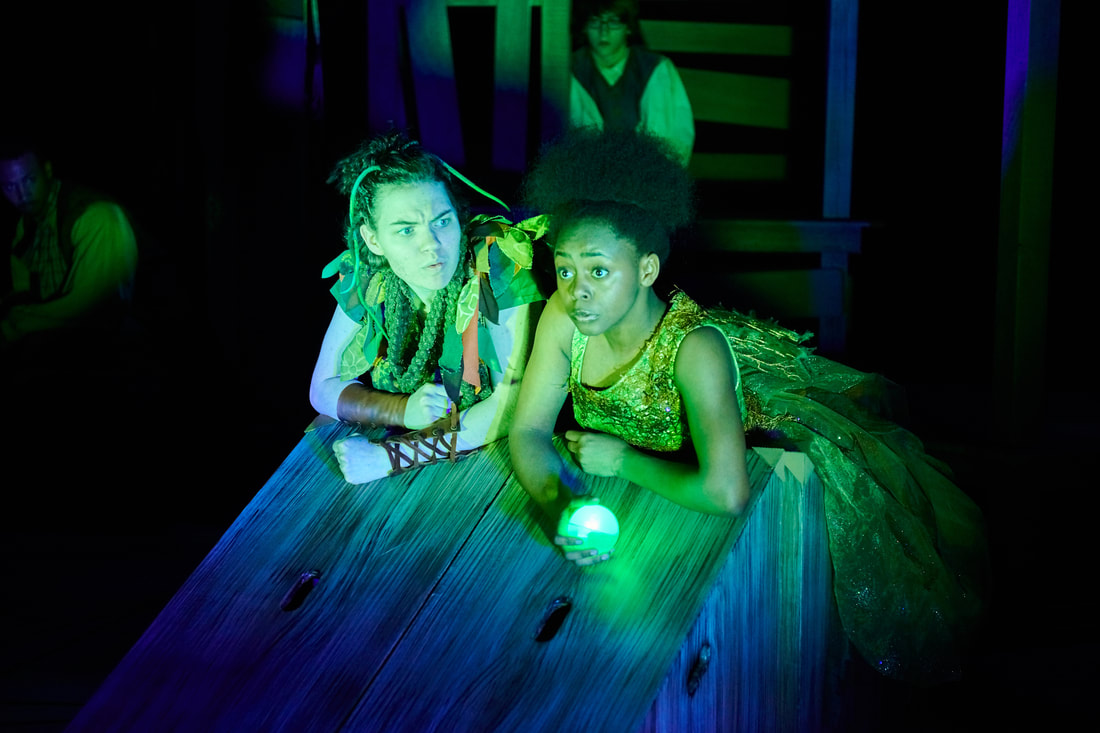
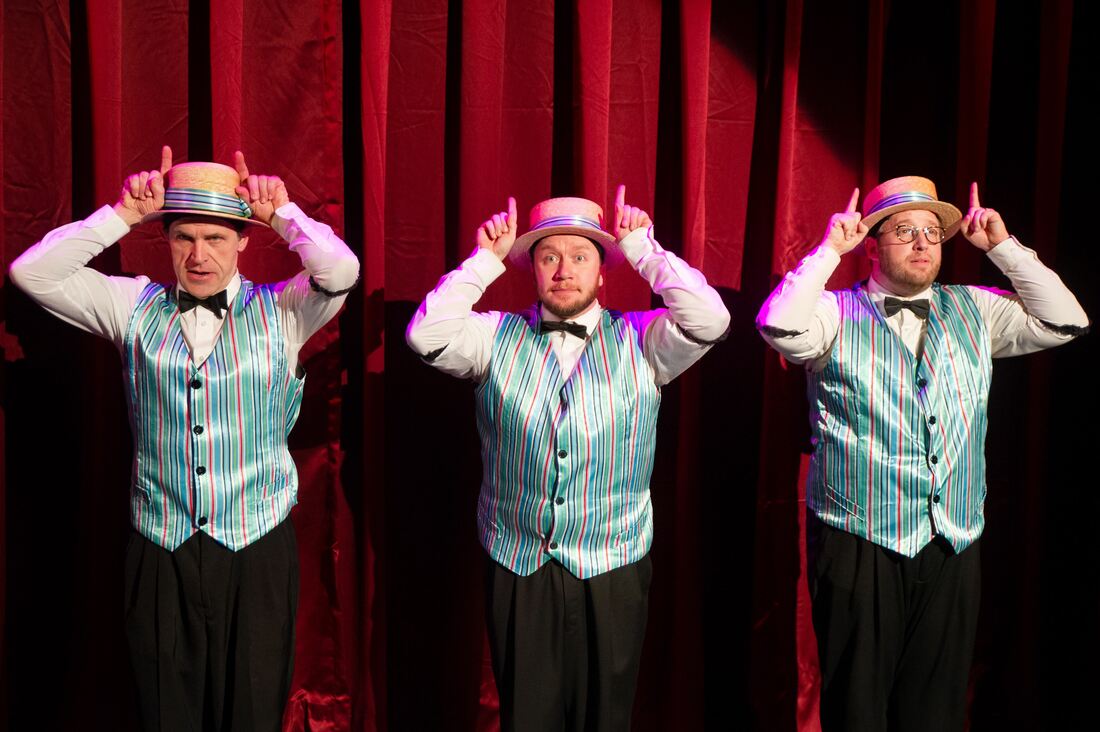
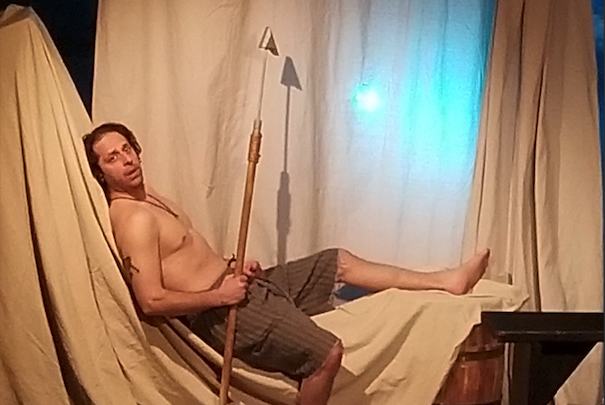
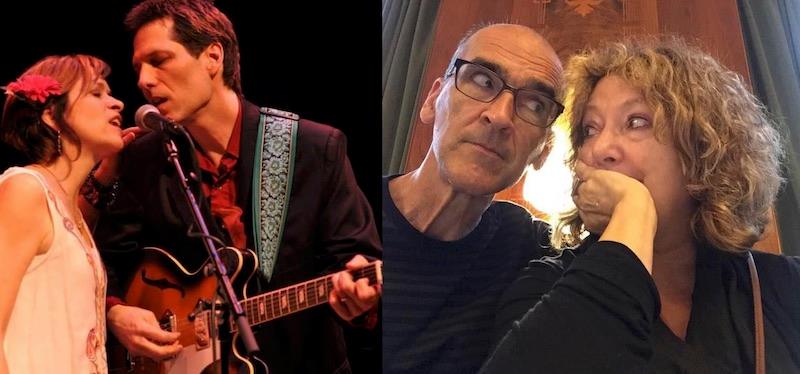
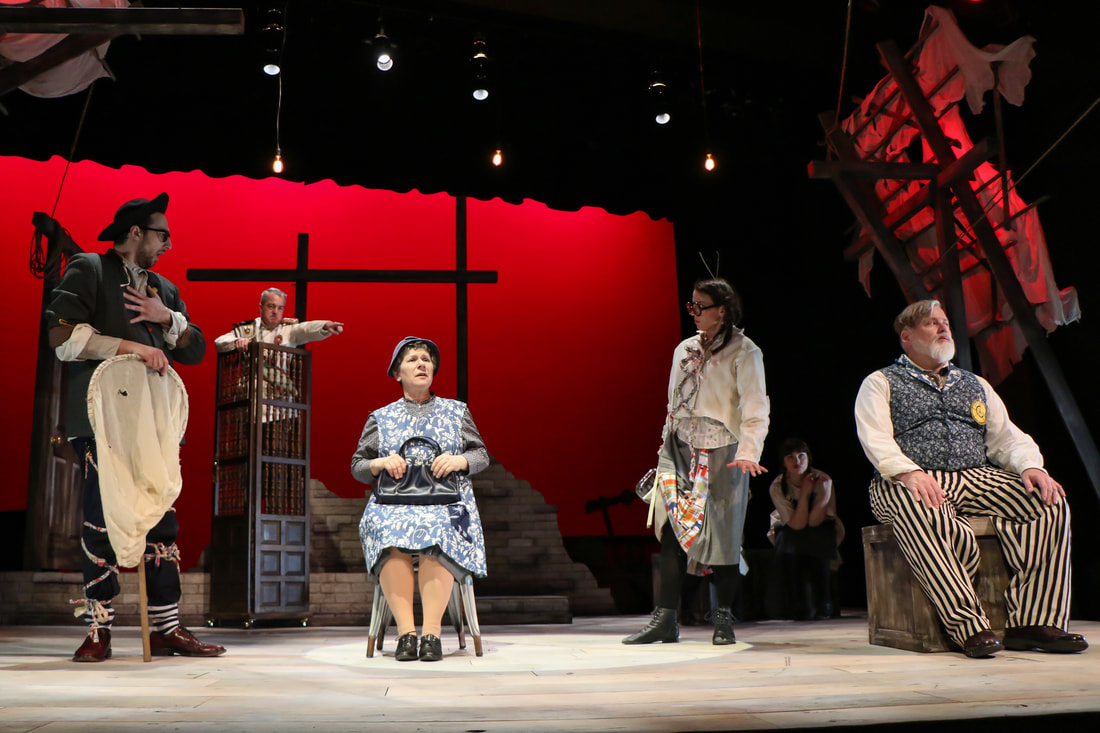
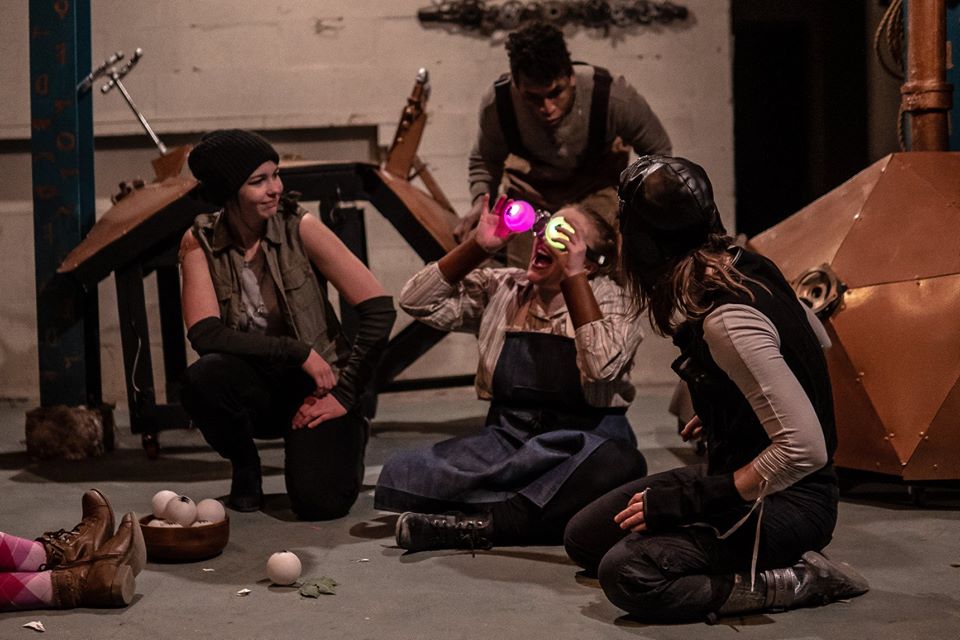
 RSS Feed
RSS Feed
